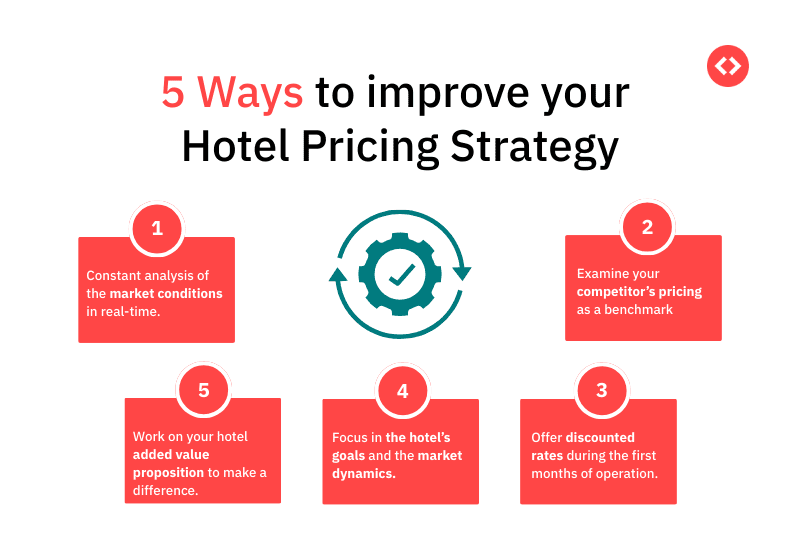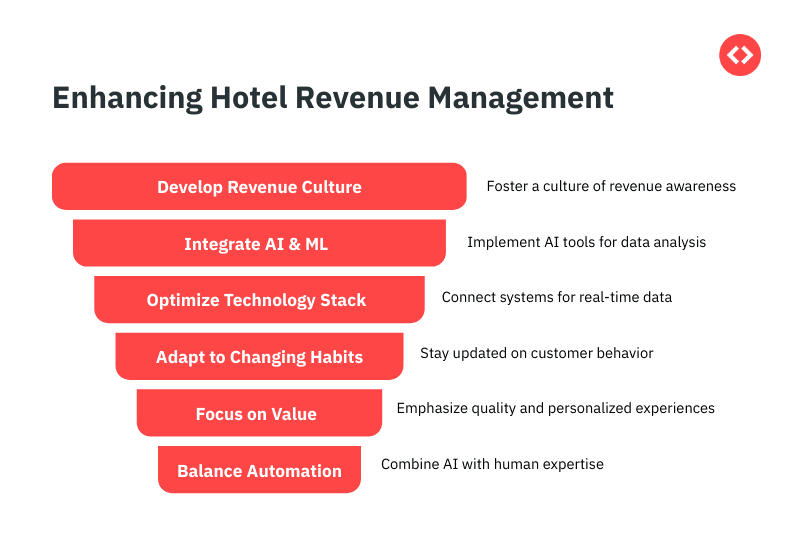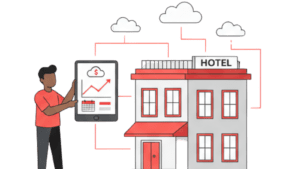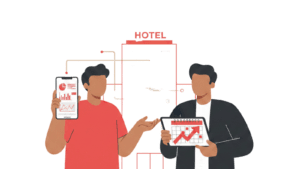Table of Contents
Updated : Feb 5, 2026
Scaling a hotel business from a single property to a multi-property hotel management operation is both an exciting and challenging endeavor. As hotel owners and managers, understanding the nuances of hotel chain operations and mastering effective hotel revenue strategies are crucial for success. According to STR’s report, data show that global hotel occupancy rates increased from 2022 to 2023, with some regions experiencing over 80% occupancy during peak periods, such as the summer of 2022, and reaching a global average of 69% by the end of 2023. Whether you’re contemplating your next expansion or managing an existing portfolio, navigating the complexities of multi-property hotel management demands strategic planning and operational insight.
The Foundations of Hotel Business Scaling
When it comes to hotel business scaling, laying a strong foundation is crucial for success. Let’s dive into the key elements that will support your journey from managing a single property to overseeing a thriving hotel chain.
1. Understand Your Market
Before expanding, it’s essential to have a deep understanding of your market. Take the time to analyze current trends, customer preferences, and competitor strategies. For instance, if you notice a growing demand for eco-friendly accommodations, consider integrating sustainable practices into your operations.
Example: A hotel owner in Miami recognizes the rising popularity of wellness tourism. By incorporating spa services and health-focused dining options across multiple properties, they successfully attract a niche market segment.
2. Streamline Operations
Effective multi-property hotel management requires streamlined operations. Implementing standardized processes across all locations ensures consistency and efficiency. This involves everything from housekeeping protocols to front desk operations.
Example: A hotel chain implementing a centralized reservation system for all its properties. This not only improves guest experience but also optimizes room inventory management, demonstrating an effective hotel revenue strategy.
3. Invest in Technology
Technology is a game-changer in hotel business scaling. Utilize property management systems (PMS) that can handle multi-property hotel management seamlessly. Technology can aid in data analysis, enabling you to make informed decisions and enhance guest experiences.
Example: A mid-sized hotel group adopts a cloud-based PMS that provides real-time data analytics. This empowers them to optimize their pricing strategy across different locations, boosting overall revenue and enhancing their hotel chain operations.
4. Focus on Brand Consistency
As you scale, maintaining brand consistency is vital. Ensure that each property delivers the same level of quality and service that your brand promises. This builds trust and loyalty among guests.
Example: A boutique hotel brand emphasizes unique design elements in every property while maintaining consistent service standards. This approach strengthened their brand identity and supported their hotel business scaling efforts.
What are the Multi-Property Hotel Management Essentials?
Scaling your hotel business from one property to multiple is an exciting yet challenging journey.
Centralized Operations System
Implementing a centralized operations system is crucial for efficient multi-property hotel management. This system should integrate reservations, guest services, and financial management into a seamless process.
For instance, The Green Leaf Hotel Group in the Midwest USA utilizes a cloud-based property management system that allows real-time updates across all their properties. This integration has improved their operational efficiency by 30%, significantly enhancing their overall hotel chain operations.
Consistent Brand Experience
Maintaining a consistent brand experience across all locations is vital in scaling your hotel business. Guests should feel the same level of service and comfort no matter which property they visit.
A great example is The Cozy Haven Hotels in Europe, known for its signature warm hospitality and unique local touches. By training staff across all hotels with the same standards and values, they have successfully reinforced their brand image while expanding into new markets.
Effective Hotel Revenue Strategies

To maximize profits across multiple properties, developing effective hotel revenue strategies is essential. Understanding market dynamics and adjusting pricing strategies accordingly can lead to increased revenue.
The Seaside Inn has mastered this by using dynamic pricing models tailored to seasonal demand fluctuations, boosting their average daily rate (ADR) by 15% year-over-year.
Streamlined Communication Channels
Clear communication channels are fundamental in multi-property hotel management. Ensuring that information flows seamlessly between properties can prevent misunderstandings and enhance coordination.
Take The Highland Hotel in Scotland as an example; they implemented a robust internal communication platform that connects all managers and staff across their hotels, leading to more cohesive team efforts and improved guest satisfaction.
Sustainable Growth Practices
Finally, adopting sustainable growth practices is key when scaling your hotel business. Focus on environmentally friendly initiatives and community engagement to build a positive brand reputation.
The Eco Stay Hotels in California have embedded sustainability into their expansion plans by investing in green technologies and supporting local businesses at each new location, thereby reinforcing their commitment to responsible growth.
Transform your hospitality approach today
Discover actionable strategies tailored for small hotel owners and managers creating unforgettable stays for your guests & expanding revenues for your hotel!
Start your 30-day FREE trial now!Key Hotel Revenue Strategies for Chains and Clusters
Effective hotel revenue strategies are crucial for ensuring consistent growth and profitability across your portfolio.
Dynamic Pricing Models
Implementing dynamic pricing models is essential for maximizing revenue across your hotel chain operations. By analyzing market demand, competitor pricing, and historical data, you can adjust your rates in real-time to optimize occupancy and revenue.
For instance, the Innovo Hotel Group has adopted a technology-driven revenue management system, utilizing a dynamic pricing model across its properties. By leveraging software that analyzed real-time market data, they increased their RevPAR by 15% within the first year of implementation. This move was critical in scaling their hotel business effectively.
Centralized Revenue Management Systems
Utilizing centralized revenue management systems allows hotel owners to maintain a cohesive strategy across all properties within their chain or cluster. These systems provide comprehensive insights and analytics for better decision-making.
For instance, GreenStay Hotels, Europe, expanded from a single property to a chain of five hotels by integrating a centralized revenue management system. This streamlined approach enabled them to maintain consistency in pricing strategies across all locations, ultimately leading to a 20% increase in overall revenue. Their success story highlights the importance of centralized systems in multi-property hotel management.
Leveraging Technology for Personalized Guest Experiences
Incorporating technology not only aids in operational efficiency but also enhances the guest experience, which is crucial for scaling a hotel business. Personalized marketing and service offerings can drive repeat business and boost your hotel’s reputation.
For instance, The Boutique Collection used guest data analytics to tailor personalized experiences for their guests across multiple properties. This strategy resulted in higher customer satisfaction scores and increased loyalty program enrollments. By investing in technology that supported personalized interactions, they saw a notable rise in both occupancy rates and guest retention.
Cross-Property Marketing Initiatives
Developing cross-property marketing initiatives can help create brand cohesion and attract a wider audience, vital for successful hotel chain operations. By promoting your entire portfolio rather than individual hotels, you amplify your market reach.
PriceLabs & Revenue Management

Running a hotel involves juggling various responsibilities—guest experience, marketing, operations, and pricing. Imagine if your room rates could automatically adjust to demand, competition, and seasonality without any manual intervention. PriceLabs offers this capability to independent hotels, enabling data-driven pricing optimization that prevents underpricing and maximizes revenue potential.
PriceLabs provides an easy setup, seamless integration with Property Management Systems (PMS), and full control over pricing, allowing you to generate more revenue with minimal effort. Here’s what you can achieve with PriceLabs:
- Always the Right Price – Update rates based on your hotel’s occupancy, competitor pricing, and market demand, eliminating guesswork.
- Keep an Eye on the Competition – Access up-to-date competitor pricing, booking trends, and seasonal demand shifts without manual tracking.
- Full Control, Zero Hassle – Customize pricing by room type, season, and booking window to align with your strategy.
- No More Manual Rate Changes – Automatically apply discounts for last-minute bookings, early reservations, or peak demand seamlessly.
- Connects with Your PMS – Compatible with over 170 Property Management Systems and Channel Managers to update rates across all platforms.
- Automated Reports, Instant Insights – Receive real-time updates on occupancy, revenue, and pricing performance directly on your dashboard.
Common Challenges and How to Overcome Them
Scaling the hotel business from a single property to a multi-property setup is an exciting yet daunting venture full of challenges. As you embark on this journey, here are some common challenges you might face and effective ways to overcome them.
Consistency in Service Quality
Maintaining consistent service quality across multiple locations is crucial for successful hotel chain operations. Inconsistencies can dilute your brand’s reputation and affect customer loyalty.
– Step 1: Develop Standard Operating Procedures (SOPs) that are meticulously detailed for every aspect of your hotel business scaling process. These SOPs should cover everything from check-in procedures to housekeeping services.
– Step 2: Implement regular training programs that focus on service consistency. Consider using e-learning platforms for multi-property hotel management to ensure all staff receive the same training.
– Step 3: Conduct regular audits and feedback sessions to monitor service quality and address any issues promptly.
Efficient Communication Across Properties
Effective communication is the backbone of successful multi-property hotel management. Miscommunication can lead to operational inefficiencies and impact your bottom line.
– Step 1: Invest in a robust communication platform that integrates seamlessly with your existing hotel chain operations systems. Opt for tools that offer real-time updates and facilitate easy information exchange.
– Step 2: Establish clear communication protocols that define who communicates what, when, and how. This clarity minimizes misunderstandings and ensures smooth operations.
– Step 3: Foster a culture of open communication where staff feel comfortable sharing insights and feedback, as this can significantly enhance hotel revenue strategies.
Diverse Market Demands
As you scale, catering to diverse market segments becomes essential. Different locations might have varying customer preferences, impacting your hotel revenue strategies.
– Step 1: Conduct thorough market research for each new location as part of your hotel business scaling strategy. Understand local demographics, preferences, and competition.
– Step 2: Tailor your offerings to meet the specific needs of each market segment while maintaining your brand’s core identity.
– Step 3: Use data analytics tools to monitor market trends and adjust your strategies accordingly continuously. This flexibility will help you maximize revenue across all properties.
Technological Integration
Integrating technology across multiple properties can be challenging, but it is essential for streamlined operations.
– Step 1: Select a comprehensive Property Management System (PMS) that supports multiple locations efficiently. The right PMS should facilitate centralized control over all aspects of hotel chain operations.
– Step 2: Ensure all systems are compatible with each other to avoid operational silos. Consider integrating solutions like Customer Relationship Management (CRM) software with your PMS for enhanced efficiency.
– Step 3: Train staff thoroughly on new technologies, emphasizing how these tools can enhance their roles and improve guest experiences.
Way Forward
The journey requires not only implementing effective hotel revenue strategies but also being adaptable to the dynamic landscape of the hospitality industry. As hotel owners and managers, embracing technology and innovative practices will be crucial as you aim for successful hotel business scaling. Moving forward, focus on refining your hotel chain operations to ensure seamless integration across all properties. Prioritizing guest satisfaction while optimizing operational efficiency will be key in navigating the complexities of multi-property hotel management. By continuously adapting your hotel revenue strategies, you can maintain a competitive edge and achieve sustainable growth in your expanding hotel business.
FAQ
1. How can multi-property hotel management enhance efficiency when scaling a hotel business?
When you’re scaling a hotel business from one property to several, multi-property hotel management becomes a crucial strategy. It allows you to centralize operations, streamline processes, and ensure consistency across all locations. By adopting integrated systems and technology, you can oversee multiple properties with greater ease, leading to improved operational efficiency. This approach enables you to monitor inventory, staff schedules, and guest preferences seamlessly, which are vital components in scaling your hotel business successfully.
2. What are the most effective hotel revenue strategies for expanding into a hotel chain?
As you scale your hotel business into a chain, it’s imperative to adopt robust hotel revenue strategies that can sustain your growth. First, consider diversifying your offerings to attract different market segments—this might include adding conference facilities or spa services that appeal to business travelers and leisure guests alike. Secondly, dynamic pricing models can optimize occupancy rates by adjusting room rates based on demand fluctuations and market trends.







